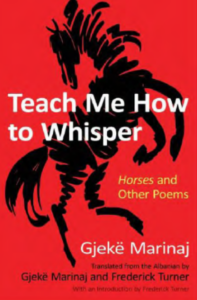Knowing Whispers in a New Poetry Collection by Gjekë Marinaj
Published in: 33. Transcription of Multitudes
Gjekë Marinaj
The poet Gjekë Marinaj’s international outlook illustrates the age-old truth that poetry has no place of permanent residence. His poems are translated and loved in many countries, and fans of his work can be found across the continents. The numerous prizes, awards and other honors he has received around the world resoundingly affirm this.
For admirers of Marinaj’s creative gifts, it comes as welcome news that Syracuse University Press has released the most comprehensive selection of his poems to date. The book, entitled Teach Me How to Whisper: “Horses” and Other Poems, includes a generous assortment of new and previous work by the poet.
Over the many years of Marinaj’s sojourn in America, English has become his primary poetic language, which in no way signals a rejection of his native roots or of the culture that raised him. Having gained American citizenship under the pressure of extraordinary circumstances, the poet inhabits both hemispheres, paying borders little mind and constantly nurturing literary relationships not only in the land that has become his home, but also in the nations of Europe, Asia and Africa. His varied, deep and unpredictable poetic trajectory interweaves the traces of these literary relationships, supported by necessarily frequent travels as well as concern for lives and fates in poetry’s domain.
Like another exile, Joseph Brodsky, Gjekë Marinaj chose to treat his rift with his homeland as a way to find himself and a new civic spirit transcending the political. Unlike Brodsky, he preferred a swift restoration and strengthening of reciprocal ties with his birthplace. A vision shaped by Albania’s nature and people remains a lasting foundation for this poet of the world.
The book shows that Marinaj’s worldwide reputation is based not only on his expansive reach in the outside world, but also on sensitivity to inner worlds and otherworldliness — common to everyone, but revealed in a special way by the labor of careful, heartfelt poetic craft.
The collection’s lines of development confirm that the shifts in Marinaj’s situation find reflection in shifts in consciousness, reinforcing the bedrock of his personality and attunement to truth. The general vector of this process can be glimpsed in the names of the nine sections: “Home,” “Albania,” “Amor,” “Admonitions,” “Acheron,” “Heroines,” “Metaphysics,” “Poets,” “Earth” and “India.” In any of the topics that attract him, Marinaj sees broad horizons for poetic intelligence.
Accordingly, poems expressing the author’s attitude toward the characters and scenes of his childhood (“My Neighbors in Brrut,” “Ode to My Parents”) demonstrate how much he treasures his early, isolated experience as a source of values for life to come. That same dawn of his life (“The Lullaby Singers,” “A Book Gift from My Parents”) fostered Marinaj’s craving for lyrical and epic poetry in folk and classical forms — and the wandering Odysseus might have served as a prototype for the future poet.
“The Return of Skënderbeu” and “Since the Time They Killed Omer” celebrate Albania’s nerve and national heroes, while “To Shkoder” and other poems mourn the tragedies of the Balkans and the pain of parting with the region. “Twenty-four Hours of Love,” “Reading Poetry with my Sweetheart” and other lyric poems show the poet’s romantic, chivalrous side.
The range of protest poems in the collection — from the famous “Horses” (Marinaj’s metaphor for his tormented people) to “Sketches in the Imagination,” with its description of a faded, impersonal world — shows that the author perceives the integrity of human life as threatened on the scale that spans immediate realities and a timeless, ubiquitous struggle.
“My Conversation with Death” and “On the Ferry of Acheron” (a river that, according to Greek mythology, flows through the underworld) identify the dark side of modernity with hell and corruption. The poet does not hide his horror and disgust before dead facts hostile to the life of the spirit.
Embodiments of Marinaj’s ideal can be seen among those whom his poetry praises — not only militant heroes, but also figures drawn from literature and history. Marinaj’s poems help to realize afresh how it matters directly for us that Antigone refused to surrender, and to feel ourselves newly moved by the fortitude and devotion of Desdemona, Emily Dickinson or the tragic Albanian heroine Rozafa — each a paragon of ethics of self-abnegation.
In such philosophical lyrics as “Hallelujah” or “The Labyrinth of Tang Thought,” the collection’s originality and freedom reach a certain peak of intensity, yielding the fruits of the author’s own detachment, a sanctum of inner life persisting amid diverse external engagements.
Of course, rising above the commonplace can render poets vulnerable, leaving them with truncated, star-crossed lives. Marinaj’s work frequently laments this side of poets’ destinies. But such sorrow is paired with a compassionate receptivity that lifts these poems beyond the usual limits of individual existence.
The poems “The Blue Nile,” “Fuji,” and “So It Seems, at Ha Long Bay” impress with their refined assessment of far-flung places approached by the outsider poet with great respect for the peoples who call them their own.
The concluding long poem “The Lost Layers of Vyasa’s Skin,” steeped in love for Indian culture and in no less tender affection for the Albanian-Calcuttan saint of our time, Mother Teresa, gives the reader a new standard for a fusion of Western and Eastern imagery and moral contemplation.
Many layers of Marinaj’s personality coexist in his poems. Teach Me How to Whisper crescendos into revelation, cultivating planetary meaning while staying true to the dearest human principles.


Speak Your Mind